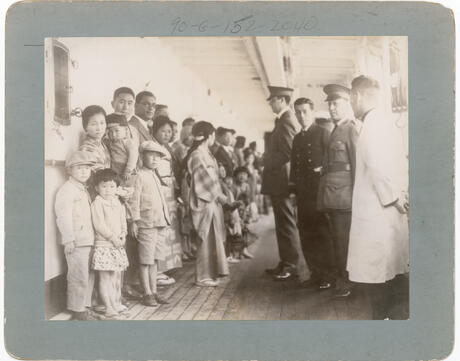There are tens of thousands of poems on these walls
They are all cries of suffering and sadness
The day that I am rid of this prison and become successful
I must remember that this chapter once existed . . . 1
Studying US history through textbooks and lectures is a common and effective way to condense and deliver information in a classroom; yet, the process can often feel detached from our current realities. Using poetry as a tool to explore the past, however, has the power to animate history. Poetry can make US history more compelling, appealing to our emotions and imagination, while evoking powerful responses from our students.
Drawing on the poetry from the Angel Island Immigration Station, which can be found in our inquiry titled “Angel Island Immigration Station: Exploring Borders and Belonging in US History,” this article will consider the ways in which poetry serves as a vehicle for developing the thinking routines of the discipline while fostering empathy and insight into the perspectives and experiences of individuals from the past.
Using Poetry to Think like a Historian
Poetry can be an effective tool for teaching histories by allowing us to explore multiple perspectives on a particular historic event. By presenting a range of viewpoints, poetry can help students develop more nuanced understandings of history while challenging their own assumptions. Moreover, poetry can be a powerful tool in illuminating the choices taken during historical events, framed within the broader cultural, social, and economic contexts. By examining how decisions were carried out in the past and the consequences of those actions, students are encouraged to think critically about the impact that their choices can have in their lives and others.
In the Angel Island inquiry, students spend the first two days building their background knowledge on the concept of borders and how the physical ports of entry on both Angel and Ellis Islands served different purposes depending on an immigrants’ country of origin. When students are introduced to the poetry from the walls of Angel Island, they have already built an understanding of the United States’ position on Chinese immigration during the Chinese Exclusion era.
Next, students read the perspectives of the Asian men whose lives were interrupted on Angel Island. As they closely read the poetry from the Angel Island Immigration Station, they have already explored the broader cultural, social, and economic considerations of the Chinese Exclusion era, and are ready to draw conclusions about the impact of the US government’s decisions on the incarcerated men. One poet writes:
America has power, but not justice.
In prison, we were victimized as if we were guilty.
Given no opportunity to explain, it was really brutal.
I bow my head in reflection but there is
nothing I can do. 2
As students analyze the poetry, they will be able to connect their background knowledge of the Chinese Exclusion era to this poet’s experience being incarcerated at the Angel Island Immigration Station. Students not only come away with a stronger grasp on the United States’ immigration policies, but also how these policies impacted the Chinese men who were unjustly detained on Angel Island.
Poetry is a formidable ally in the teaching of US history: offering a range of perspectives, illuminating the choices and consequences of events and actions, and framing events within their full context. By embracing poetry in the classroom, educators can support students in developing the critical thinking skills that it takes to examine poetry as a historian.
Using Poetry to Foster Empathy
Poetry also has the unique ability to humanize people from the past, granting them a voice that resonates on a personal level. When students engage with the verses of those who have shaped history, they can cultivate a deep knowledge of the individual's inner world—his or her thoughts, emotions, and aspirations.
In our Angel Island Immigration Station inquiry, poetry serves as a bridge to the emotional landscape of the era of Asian exclusion, nurturing empathy for the people who bravely came to the United States for a better life. This connection to the human heart can render history vivid and meaningful, illustrating our shared humanity. Consider this poem found at the Angel Island Immigration Station:
In the quiet of night, I heard, faintly, the whistling of wind.
The forms and shadows saddened me; upon
seeing the landscape, I composed a poem.
The floating clouds, the fog, darken the sky.
The moon shines faintly as the insects chirp.
Grief and bitterness entwined are heaven sent.
The sad person sits alone, leaning by a window. 3
As students read this poem and others, they select one or two lines from the poems that interest them. Then, they engage in journaling using the Text-to-Text, Text-to-Self, Text-to-World strategy. These journal prompts cultivate empathy by asking students to sit in the shoes of the men who were incarcerated on Angel Island. Their journal responses may acknowledge the familiarity of looking at the night sky and listening intently for the noises that accompany it. They may be drawn to the feelings of grief, bitterness, and sadness that can come up when alone with one’s thoughts. Students will not know much about the men who wrote these poems, but by taking the men’s words into their own journals, they are able to connect with their hopes, dreams, and setbacks.
In summary, poetry can be an important tool for teaching history. As students engage with poetic narratives like those in the Angel Island Immigration Station inquiry, they will gain a deeper understanding of the past and develop empathy for the perspectives and experiences of people throughout US history.
- 1Find this poem, as well as others, from the Angel Island Immigration Station inquiry at this link: https://www.facinghistory.org/resource-library/angel-island-poetry
- 2Find this poem, as well as others, from the Angel Island Immigration Station inquiry at this link: https://www.facinghistory.org/resource-library/angel-island-poetry
- 3Find this poem, as well as others, from the Angel Island Immigration Station inquiry at this link: https://www.facinghistory.org/resource-library/angel-island-poetry














